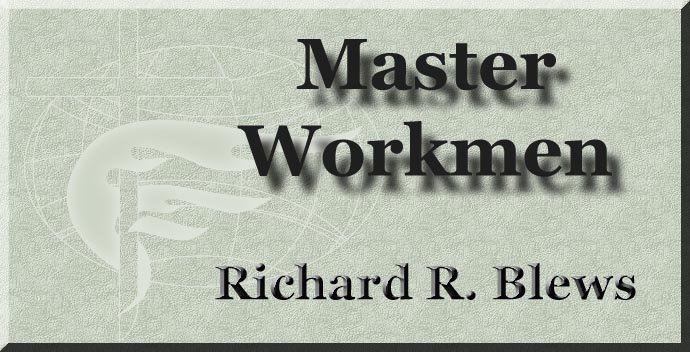
Master Workmen
By Richard R. Blews
Preface
|
History is a great panorama of endless change and this is the secret of its spell. The story of the rise, greatness, and decay of a nation is like some vast epic which contains as subsidiary episodes the varied stories of the rise, greatness, and decay of creeds, of parties, and men. This volume deals with that tributary to the great stream of history known as the Free Methodist Church. As was said of Methodism in the days of her primitive piety, so it can be truthfully said of Free Methodism -- "it is Christianity in earnest." Hers is the heroic task to hold high the torch from the hand of John Wesley, "to spread scriptural holiness over these lands." These studies of the church have been cast in biographical form illustrating the pregnant truth expressed by Carlyle that the history of any country or movement is in the biographies of the men who made it. The story of Luther is the history of the Reformation. When he arose from his knees on Pilate's stairway in Rome a converted man, the face of the world was changed. The thought of men and the curse of nations was changed that day. Carlyle declares that the moment Luther defied the wrath of the Pope at the Diet of Worms was the greatest moment in the modern history of men. History is written by God in terms of human personality. Genesis gathers around eight men. The Bible presents eras and epochs but at the center of each is a human personality and frequently the man is the key to the age. An epitome of Old Testament History is summarized in the eleventh chapter of Hebrews, but it is presented in terms of human personality. God's estimate of all is seen in the heroes of faith. The world erects monuments to her soldiers who have led their legions to die on the field of battle; but
In finality, ideas are the only things in the universe that are immortal. Monuments fall into decay with the passing of the silent centuries but the ideas and ideals of the race, if they be lofty, endure. We cannot add to the immortality of the departed. They do not need us but we forever need them. The glory trailing in the clouds behind them after their sun has set, falls with its benediction upon us who are left, and we are inspired by their examples and emulate the noble principles for which they stood. Their lives exhale a sweet perfume and constitute a priceless legacy which posterity should not willingly let die. In these biographical sketches of the master workmen of the church, more extended space has been devoted to Bishops Roberts and Hart because they stood at the helm in the period of the church's organization, and because those fashioning forces which combined to give birth to Free Methodism have an increasing interest with the passing of the years.
|
|
 |
 |
|
|
|
-
Site Navigation
 Home
Home What's New
What's New Bible
Bible Photos
Photos Hiking
Hiking E-Books
E-Books Genealogy
Genealogy Profile
Free Plug-ins You May Need
Profile
Free Plug-ins You May Need
 Get Java
Get Java.png) Get Flash
Get Flash Get 7-Zip
Get 7-Zip Get Acrobat Reader
Get Acrobat Reader Get TheWORD
Get TheWORD